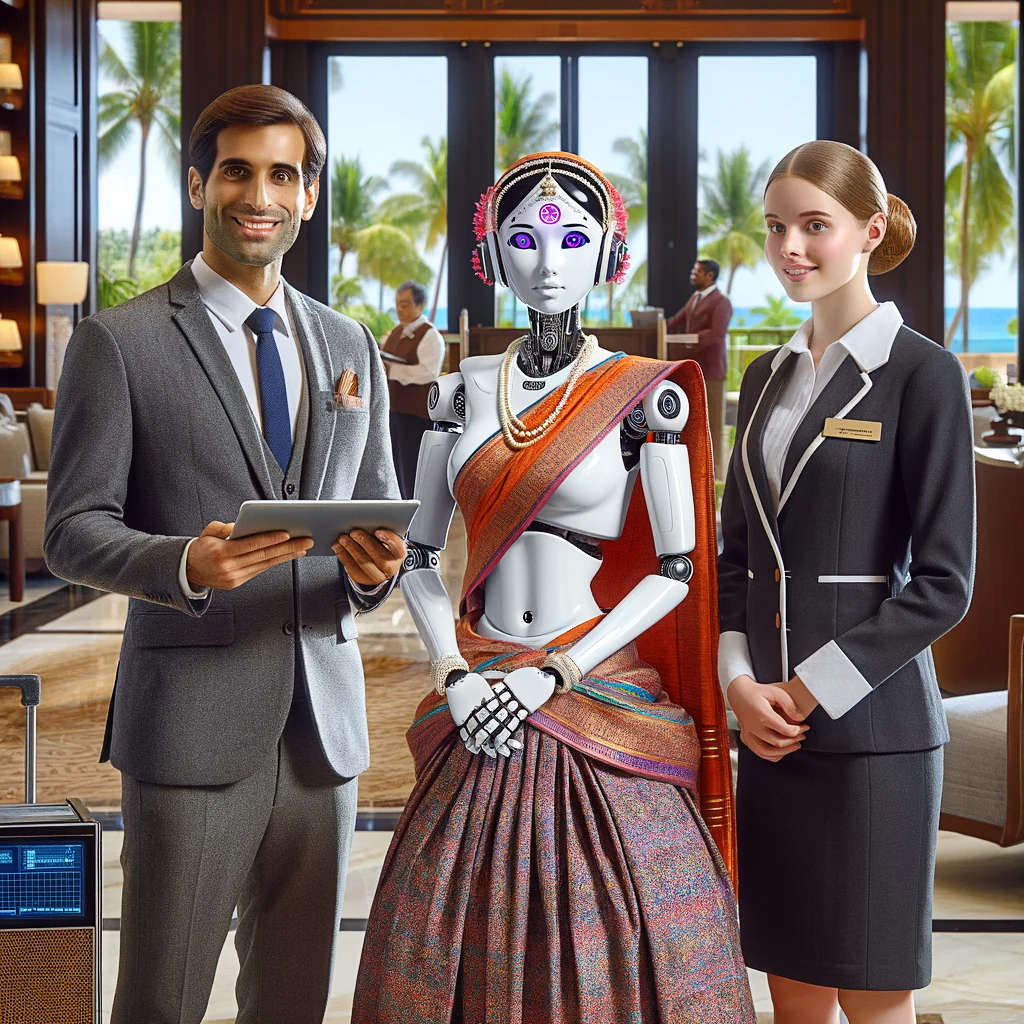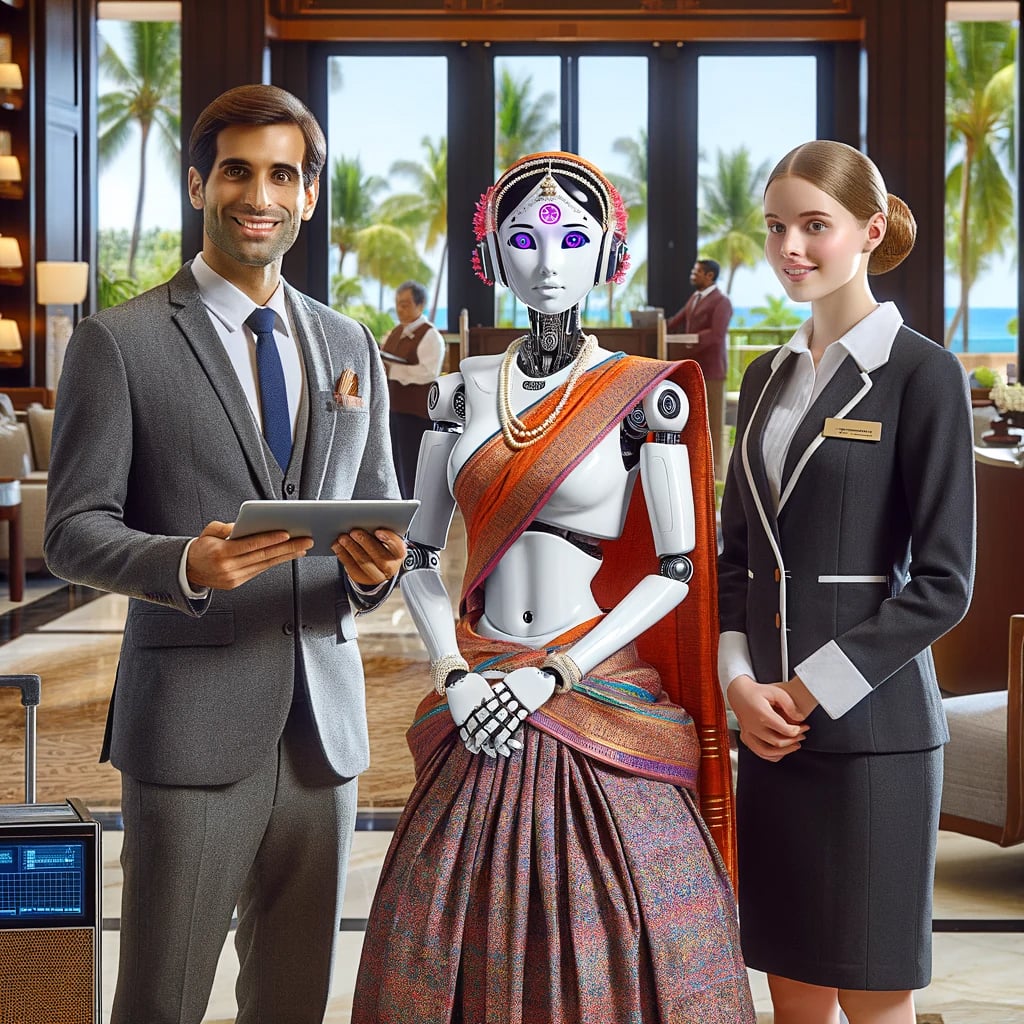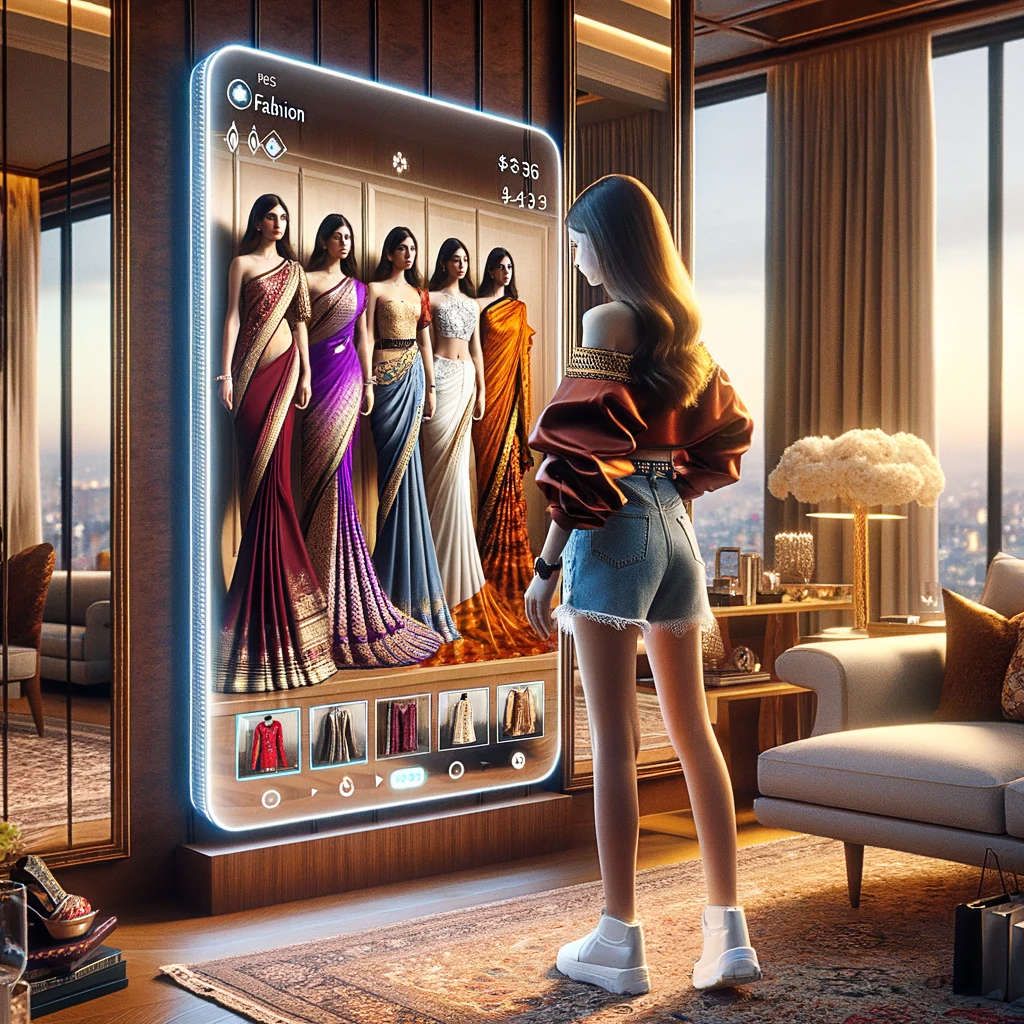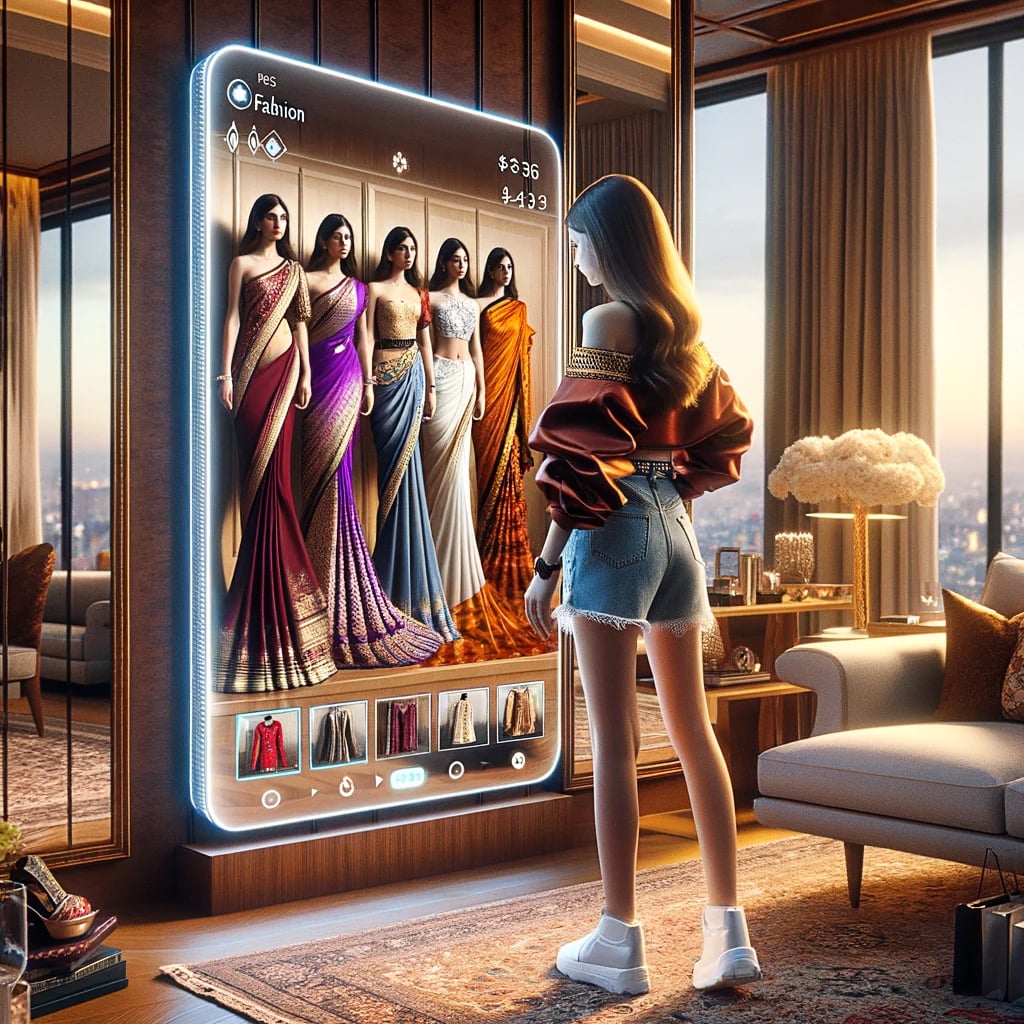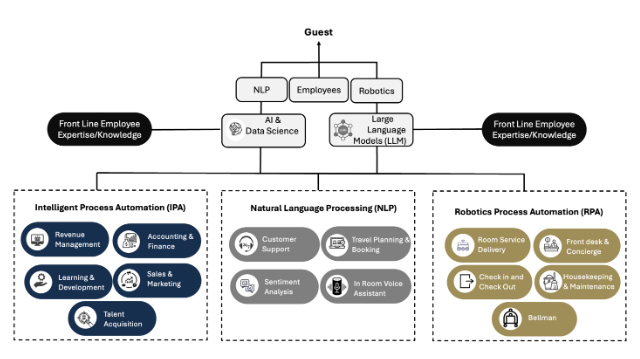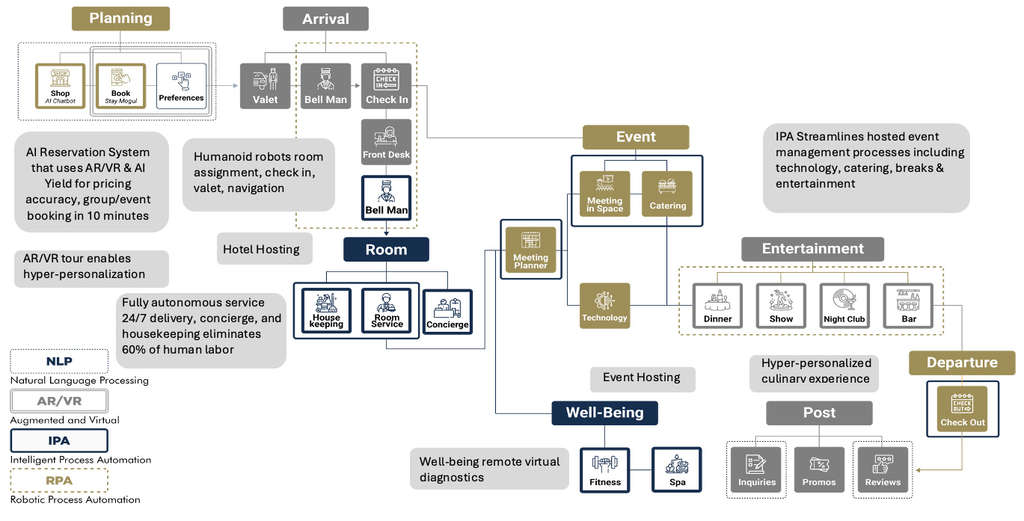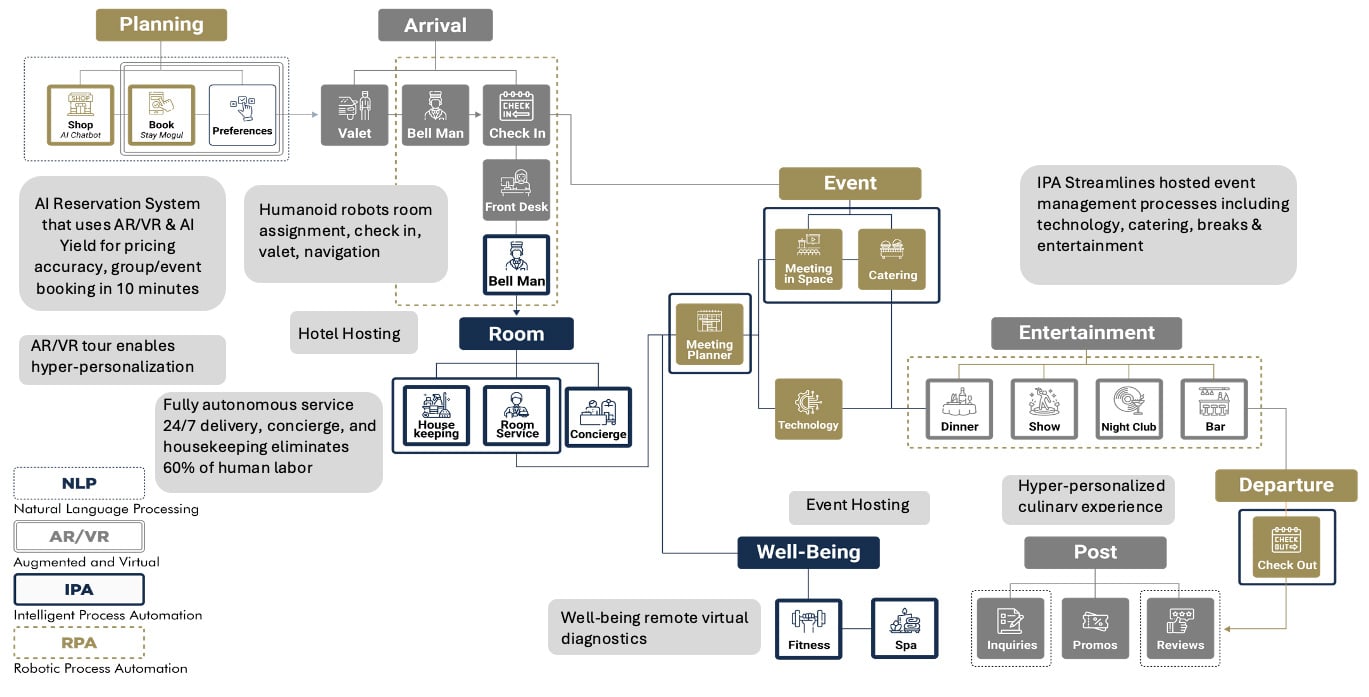Envisaging the Semi Autonomous Hotel of the Future
Imagine that you are eagerly organizing a weekend getaway for your daughter's 16th birthday. You're on the hunt for a boutique luxury resort, ideally located within a two-hour drive from your home, to accommodate her and her 100 closest friends for an unforgettable celebration. Given her immense love for Bollywood, you're seeking a venue that can truly make her feel like a celebrity on her special day. Your checklist includes booking 50 double-bed rooms, 5000 square feet event space capable of hosting a dinner for 100 guests with live entertainment, and a facility that can sustain a vibrant dance party well into the night.
AI Travel Planning
Opting for the efficiency of technology, you turn to the AI assistant on your preferred internet search engine. Your initial input includes the date, geographical location, desired resort class and amenities, specific room types and floors, catering needs for food and beverages, and spa treatments. The AI system efficiently processes your criteria, returning a curated list of boutique lifestyle and luxury resort options that meet your specifications. Among these, you focus on the one boasting the highest accolades for hosting social events.
Carefully reviewing the presented choices, you compare amenities, ratings, and pricing for each element of the potential experience. Your attention is drawn to a particular luxury resort located on Ocean Drive in Santa Monica. This venue stands out with its celebrity chef-led restaurant renowned for catering upscale events, a rooftop nightclub offering panoramic views of the Santa Monica Pier and the Pacific Ocean, capable of accommodating a 100-person group. It's highly praised for social events and includes a star meeting planner, aligning impressively with 92% of your search preferences, including valet parking.
You land on the property’s website, and its AI-enabled booking engine asks you questions about your daughter's personality and interests, such as her preferred genres of music, food and favorite treatments and services in the spa and salon. It turns out your daughter is a big fan of Bollywood Bhangra dance and movies, she loves Southern Indian vegetarian cuisine, and she is passionate about curated fashion such as jewel embroidered Sarees and Lengha dress. Based on your answers, the hotel site generates an itinerary which includes a package with preference-matching percentages, pictures and videos of each activity, customer reviews and a la carte pricing options.
The booking engine lets you delve into an Augmented Reality (AR) experience to explore and personalize every aspect of your event. Picture yourself virtually walking through the finest suites and rooms, getting a feel for the event space, and browsing the dining options. You also get to customize your event down to the last detail – from selecting the theme-matching decor, lighting, and music, to arranging how the food is presented and where guests will sit. You even have the freedom to tweak things like the color scheme, the layout of the tables, lighting of the event, and the seating arrangements. And for an extra touch of excitement, you add a special Bollywood Bhangra dance performance and a live chef food presentation.
Once you're happy with the preview, you reach out to the event planning team to finalize everything. This includes confirming the hotel room allocation, pinpointing the exact room locations, and setting times for the dinner and party. The event planner promptly sends over a quote. You then secure your booking with a deposit and complete the payment. Excitedly, you share the party preview with your daughter and the guests, stirring up anticipation for the celebration. Remarkably, the entire process of searching, planning, booking, and communicating is streamlined and efficient, taking just 30 minutes.
Arrival Experience
Arriving at the hotel a day before the party, your family of three looks forward to a relaxing day and a chance to check out the event space for any last tweaks. In the lobby, the arrival manager, and a hotel intern, accompanied by a humanoid robot named Natasha clad in traditional Indian attire, warmly welcome you, celebrating your daughter's 16th birthday. The intern hands you the hotel's signature welcome drink. After some friendly exchanges, Natasha scans your retina, enabling a unique check-in process via a text message code. Once scanned, she efficiently checks you in and instructs her robotic colleague, Henry, donned in a virtual hotel uniform, to take care of your luggage and guide you to your room.
As Henry escorts you to your room, Natasha briefs your wife on the latest preparations for your daughter's birthday celebration. She connects you to the VIP event host, who greets you via a tablet. The host enthusiastically shares that her team, along with the chef, are dedicated to crafting an unforgettable experience for your daughter and the guests. Natasha also reminds you to utilize the hotel's mobile app for event planning. Through the app, you can stay updated with live progress on the event's organization and make any necessary changes on the go.
Luxury Suite Experience
Upon being verified by the robot via biometric check-in, you use the barcode sent to your phone to access your two-bedroom suite. You're immediately welcomed by a digital display of Bollywood art, a favorite of your daughter's, adorning the walls and her preferred Indian pop tunes playing softly. In the living room, a high-tech mirror catches your eye, showcasing a range of clothing options through augmented reality, from contemporary designs to traditional Indian wear, all available for rent from an online retailer with the promise of delivery to your suite within three hours.
In the master bedroom, you're comforted to find a bed equipped with pillows designed to support your pregnant wife's needs. Nearby, the “NASA Analyzer” stands out - a cutting-edge, non-invasive medical diagnostic tool, compact enough for deep-space missions, capable of analyzing various sample types and measuring a wide array of analytes. Intrigued, you scan its QR code to learn more about this advanced technology.
Your exploration leads you to the second bedroom, where birthday decorations, balloons, and a personalized note from the General Manager await, all celebrating your daughter's special day. Feeling a bit peckish, you peruse the kitchen, finding it stocked with your family's favorite drinks and a digital menu that offers room service from the hotel's casual eatery, alongside recommendations from local venues and the hotel's own restaurants, all tailored to fit your family's unique dietary preferences based on your “live to 120” AI genomic profile.
You switch on the TV, greeted by a personalized welcome message. Eager to catch up on your favorite Netflix series right where you left off at home, you navigate to your customized entertainment channel. This unique feature seamlessly integrates with your personal Netflix, Hulu, Paramount, and other streaming accounts, allowing you to continue your viewing experience without missing a beat, enveloped in the comfort of your suite.
AI Enhanced Event Experience
The following day, with excitement building for the birthday celebration, you quickly open the mobile app to confirm that the party preparations are on track, and everything is set for the event. After ensuring all is in order, you head down to the lobby. Greeted by a robot, you receive warm birthday wishes for your daughter. The robot then guides you to the rooftop, where an eagerly awaited party is set to unfold.
As you ascend to the rooftop, the VIP event manager welcomes you with a delightful glass of Mango Lassi. Holding the refreshing drink, you stroll around to survey the setup. The rooftop has been transformed with a vibrant Bollywood theme, complete with event organizers dressed in Punjabi attire, and the energizing rhythms of Bollywood music inviting you to dance.
While mingling with other parents on the rooftop, another alert captures your attention. A guest messages to say they'll be bringing an additional five people. This news briefly unsettles you, as the party was meticulously planned for 100 attendees. Without hesitation, you access the hotel app to communicate with your VIP event host. You request extra seating to accommodate the unforeseen guests. They respond promptly, assuring you of a swift resolution. Comforted by their quick action, you let go of your concerns and once again immerse yourself in the joy of the party.
Food and Beverage Experience
At the party, you and your guests relish the array of foods and drinks thoughtfully customized by the hotel to align with the theme and preferences of your gathering. The menu, prepared with attention to dietary needs, offers vegetarian, dairy-free, and gluten-free options. Organically sourced from local farms, the food is presented in a visually appealing manner, segregated into vegan, vegetarian, and meat selections. The spread includes vibrant and tasty dishes like Samosas, Panipuri, and a variety of Biryani, catering to the refined tastes of culinary enthusiasts. The beverage options, including Mango Lassi, Masala Chai, Nimbu Pani, and Thandai, are equally refreshing and delightful.
The chef and sous-chef add an entertaining twist to the evening by personally presenting the entrees. They engage the guests with stories about the origins and cultural significance of each dish and drink, interspersed with humor and interactive food chemistry tips for the kids, such as balancing spices with yogurt. The culinary team's appearance culminates in a well-deserved standing ovation, photo sessions with the teens and their parents, and heartfelt thanks from the attendees.
The party is full of excitement, with you thoroughly enjoying the chef's presentation and the delectable food. You express your gratitude and admiration for her team's efforts. The arrival of a group of Bollywood dancers, performing your daughter's favorite Bhangra dance, elevates the celebration. The party peaks as the chef presents a triple-layered birthday cake while everyone sings 'Happy Birthday' to your daughter, accompanied by the legendary voice of Lata Mangeshkar in the background. The event concludes on a high note, leaving everyone content and delighted.
Post Event Experience
The next day, you receive the captured videos and photos through the event planner app, allowing you to instantly download and share these cherished moments on social media. Shortly thereafter, you're invited to review and tip the hotel team, including the event planner, chef, and even the robots, for their exceptional service and contribution to a memorable celebration.
How AI Powers the Semi-Autonomous Hotels
Thanks to advances in artificial intelligence and robotics, such customer innovation scenarios are not farfetched. Academic research from the University of Kong and Sejong University in Seoul has validated that the fit between robots and brand personality influences consumer reactions. High-contact robots, which handle tasks like check-in and dining services, are best suited for brands that are exciting, trendy, youthful, and imaginative.
AI at the Operational Core
The semi-autonomous hotels will be a place where human and machine intelligence work together to create a seamless and personalized experience for guests, supported by an AI-adjacent workforce. In this context, AI can enable hotels to run more efficiently by using an AI-enabled operating system that integrates disparate systems and external data sources. The operating system will act as a unifier that connects various components, such as property management systems (PMS), revenue management systems (RMS), customer relationship management (CRM), point of sale systems (POS), and human resources information systems (HRIS). It employs sophisticated algorithms to refine operations, inform decisions on daily pricing, staffing, marketing, and inventory control, and effectively bridges the gap between “soft” data including digital bookings and guest preferences and “hard” data that captures the nuanced expertise of hospitality personnel.
To achieve the vision of a semi-autonomous hospitality, three key technologies are leveraged: Intelligent Process Automation (IPA), Robotics Process Automation (RPA), and Natural Language Processing (NLP) to redefine the customer experience pre-stay, during the stay, and post-stay (see figure 4).
Here’s how these technologies are going to be incorporated to achieve semi-autonomous hospitality:
Natural Language Processing (NLP):
Implementing Natural Language Processing (NLP) significantly elevates customer service and operational efficiency. NLP models can be integrated into various systems, including the reservation system, in-room service voice assistants (part of the Property Management System), and the Customer Relationship Management (CRM) system. Key areas where NLP makes a difference include:
- Pre-Stay: Intelligent chatbots, powered by text-generation NLP models, will be integrated into the booking engine, mobile app, and social media platforms. These bots will handle natural language queries from potential guests about room availability, booking conditions, amenities, and special requests. By providing instant responses, chatbots can enhance customer satisfaction by making essential information readily accessible, thereby reducing the need for human intervention. Each interaction with these chatbots will be logged and analyzed to gain insights into guest preferences and market trends, allowing hotels to tailor their offerings and enhance their communication channels, including FAQs.
- During the Stay: Rooms will feature voice-activated devices integrated with the Property Management System (PMS), enabling guests to interact with services using simple voice commands. These interactions, managed by speech recognition models, will cover services such as room service and housekeeping. This integration not only personalizes the guest experience but also improves operational efficiency by automating routine requests, thereby allowing staff to focus on other critical tasks. The data gathered from these devices will be analyzed to optimize service delivery, identify peak request times, and enhance guest satisfaction.
- Post-Stay: After their stay, guests will interact with the Customer Relationship Management (CRM) system where NLP will automate responses to common inquiries about bills and refunds. Additionally, sentiment analysis will be applied to reviews and feedback across various platforms. This automation will expedite responses and improve the efficiency of administrative processes. By analyzing guest feedback, hotels can derive actionable insights, tailor marketing campaigns, and refine services to better meet the expectations of future guests.
Robotics Process Automation (RPA):
RPA will concentrate on automating labor-intensive, customer-facing tasks to enhance service delivery. Some of the areas that will be automated are:
- Room Service Delivery: Service robots will manage order intake, inventory, and delivery directly to guest rooms, ensuring timely and accurate service.
- Front Desk and Concierge: Automating check-in/check-out processes and providing 24/7 concierge services to enhance guest convenience and satisfaction.
- Housekeeping, Engineering and Maintenance: Robots will handle cleaning tasks such as vacuuming, sweeping, and wiping surfaces, as well as routine maintenance checks, ensuring a consistently high standard of cleanliness and upkeep. Remote and smart engineering systems, equipped with IoT sensors, will monitor, and manage building infrastructure, optimize energy use and automating maintenance through predictive analytics to quickly address any issues.
- Valet Services: Automating luggage handling and delivery to guest rooms to streamline the arrival and departure experience.
Intelligent Process Automation (IPA):
Automating essential back-office functions is vital for achieving semi-autonomous hospitality. This may require partnering with third-party technology providers to streamline operations. Key functions to automate include:
- Accounting and Finance: Automating financial transactions, reporting, and auditing processes to ensure accuracy and reduce manual effort.
- Revenue Management: Implementing automated pricing and inventory management systems to optimize revenue and enhance profitability.
- Sales and Marketing: Utilizing IPA to manage customer data, execute marketing campaigns, and analyze performance metrics for more effective strategies.
- Learning and Development: Automating training modules, instigating and tracking employee progress to foster continuous improvement and skill development.
- Talent Acquisition: Streamlining recruitment processes, from sourcing candidates to onboarding, to attract and retain top talent efficiently.
Talent Engine
Semi-autonomous hotels are powered by a Talent Engine at their core, acting as a vibrant community that attracts hidden workers, legal immigrants, and freelancers, including a hybrid and remote workforce. It uses data from independent third-party sources and algorithms to help organizations identify rising and elite talents within and outside their organization.
Data Science and Operations are the core of the Talent Engine, where data is used to find, evaluate, and rank the best talents based on their merits. The Talent Engine also features a two-sided talent marketplace that connects the top talents with projects, including opportunities outside the organization. Moreover, the Talent Engine offers learning and development opportunities for talents, using AR/VR and experiential learning, to advance their career goals.
The Talent Engine also acts as a central data repository for training the language models. Each humanoid robot has a profile where employees can contribute to its knowledge base. These profiles detail the contributions of each talent, showcasing the data and knowledge imparted to the robot, along with the dates and times of the training sessions. Employees who participate in training the robots earn lifetime royalties, enabling them to create lasting wealth as front-line workers.
Leveraging AI and Data Analytics, the Talent Engine plays a crucial role in performance management by effectively managing and enhancing performance across all levels of operations. These technologies allow operators to analyze vast amounts of data, providing deep insights from regional operations down to individual properties. This comprehensive approach helps identify areas for improvement across the entire portfolio.
AI models delve deep into customer feedback and reviews, as well as individual employee performance metrics. By meticulously analyzing this data through the Internal Human Capital Management (HCM) System, the AI identifies skill gaps and recommends specific training, educational resources, and experiential learning opportunities tailored to enhance employee capabilities. This fosters an environment of continuous improvement, ensuring that service standards are not only bolstered but consistently maintained across all operations.
This strategic use of AI in performance management allows operators to optimize every aspect of the service profit chain, from employee development to customer satisfaction. As a result, they can deliver exceptional service consistently, solidifying their position as a leader in the hospitality industry.
Reservation System
The progression towards a data-driven, algorithmic approach in yield management not only maximizes revenue and reduces the need for intermediaries such as channel managers, online travel agencies, and meta search engines. But an AI-driven booking engine doesn't just sell and book a room. It constructs an experience that matches customers with accommodations and experiences which starts with their stay preferences, such as bedding type, music genre, soap and shampoo brands, towel types, shower temperature, and other preferences. The reservation system also matches customers to branded robots, otherwise known as hosts, that can adopt the service style and tone of voice, methods, and frequency of communication the guest seeks on the specific travel occasion.
Personalizing the Future of Travel Marketing
Semi-autonomous hotels transform the landscape of hospitality by learning and predicting guest preferences, creating a marketing approach that feels almost telepathic. When a potential guest interacts online, the AI begins crafting a unique experience. A couple planning their anniversary weekend at a luxury resort could virtually stroll through a romantic sunset beach walk, construct their meal, design their dinner food presentation, and select an eco-tourism tour before booking their stay.
Moreover, AI integration extends to real-time, on-site customization during the stay. Here are some ways semi-autonomous hotels can create bespoke customer experiences, typically reserved for luxury customers:
- Hyper-segmentation: Semi-autonomous hotels can use advanced analytics and machine learning to hyper-segment their customers into psychographic dimensions that speak to their service style, such as bohemian luxe, which describes rising technology and entertainment entrepreneurs who prefer to cherish curated local discoveries and informal and relaxed service style typically seen in independent and boutique hotels.
- Lifestyle Programming: Each individual hotel could have an open-source content channel that features appraised local musicians, entertainers, and other creatives. Using data from various sources, such as social media and purchasing trends on applications such as Spotify and Netflix, hoteliers could introduce content from up-and-coming local artists that match a customer’s interests.
Advancing Sustainability
The semi-autonomous hotel is driven by the vision of providing guests with the information and tools they need to advance sustainability in all aspects of their experience. Using sensors, Internet of Thing (IoT), and advanced analytics, the customers can accomplish the following objectives:
- Minimizing Food Waste: AI analyzes the guests’ preferences and dietary needs and predicts the optimal amount and variety of food to prepare, thus avoiding food waste. AI is fully integrated into the chef’s procurement system and suggests locally sourced ingredients that have lower environmental impact and support local farmers, proposes catering menus that are more plant-based, seasonal, and organic, and tracks the environmental impact of each ingredient, such as the CO2 emissions, water usage, land use, and biodiversity loss. Excess food is automatically routed to local food banks and charities in an integrated supply chain.
- Reducing Carbon Footprint: The semi-autonomous hotel model motivates guests to reduce their carbon footprint during their stay by tracking and analyzing data such as transportation modes, travel distances, energy and water consumption and creating a carbon footprint report at the end of the stay. Guests will be incentivized with discounts for lowering their carbon footprint during their stay and consuming less energy.
- Decreasing Energy Consumption: The semi-autonomous hotel model saves energy by using intelligent devices and sensors that control the lighting, heating, cooling, and ventilation of the rooms and facilities according to the occupancy, weather, and time of the day. The semi-autonomous hotel model also relies on renewable energy sources, such as solar panels, wind turbines, and geothermal systems, to run the hotel and lower its reliance on fossil fuels.
Enabling Health and Wellbeing
Frequent long-haul travel negatively impacts health and reduces life spans due to changes in time zones, nutrition, sleeping pattern, air quality, and other factors. The semi-autonomous hotels could integrate into well-being data apps connected to the room’s remote diagnostics and share information to selected health care providers. The science of sleep is also fertile ground for innovation: smart beds with sleep tracking sensors, temperature control, and an adjustable base can enhance sleep quality for guests. Smart bathrooms could provide urine and nutrition analysis to detect any health issues or deficiencies and recommendations to a customer and their health care provider. Smart mirrors can project the overall health statistics of the guests, such as blood pressure, heart rate, body mass index, and stress level, offering suggestions for better decision-making and well-being. Smart food menus can generate curated food options based on the guests’ nutrition needs, preferences, and allergies. In a world where healthcare is becoming more remote and personalized, these technologies will enable customers to improve their well-being through actionable data that leads to better decision-making, saves time and money, and prevents disease.
Semi-Autonomous Hotels: Incubators for Strategic Innovation
Employees are still the most critical component of the semi-autonomous hotels. Without the expertise and creativity of the hotel employees who are part-owners of the property and compensated for their creation of intellectual property, building the semi-autonomous hotels will be impossible. Anthropomorphizing robots, which has captured the world’s attention, is the next frontier in lifestyle hospitality. As hotel managers evolve from static programming of their properties to content creators in a world of AI-powered entertainment, new revenue models are created including streaming events and partnering with studios to produce pulse-racing, spine-tingling material to communities that relish drama. In the process, the stars of the show such as celebrity chefs, event planners, and their teams can receive a share of the royalties.
The semi-autonomous hotels must foster a culture of innovation among its employees. The hotel will not require a dedicated R&D department, but artificial intelligence will facilitate collaboration between hospitality experts, data scientists and engineers by prompting them to explore new ways of enhancing hospitality and improving service innovation. AI will automate experimentation with innovative ideas, learn from failures, and share best practices across a network of properties.
Responsible AI
These innovations undoubtedly enhance the overall guest experience; however, they also bring forth significant ethical and security considerations. The OECD defines AI as a machine-based system that can, for a given set of human defined-objectives, make predictions, recommendations or decisions influencing real or virtual environments.
It classifies AI cases into one of the following 7 types: hyper-personalization, recognition, conversation and human interaction, predictive decision and analytics, goal-driven systems, autonomous systems, and patterns and anomalies. Responsible AI requires establishing global auditing standards and requirements, starting with authenticating AI-generated content, user testing and content traceability in areas that protect consumers and employees. It’s imperative that the semi-autonomous hotels address the following dimensions of Responsible AI effectively:
- Privacy and Security: The gathering and storage of guest data for personalization and automation can give rise to substantial privacy concerns. Guests may fret about the utilization of their data, who possesses access to it, and whether it receives adequate protection against potential breaches. The advent of generative AI has made social engineering increasingly accessible, rendering humans more susceptible to breaches than AI-powered systems. Semi-autonomous hotels have embedded comprehensive security features. Guests can activate a fully encrypted stay feature, ensuring that their data and information are thoroughly concealed and stored separately, thereby guaranteeing protection against privacy and personal data breaches even in the event of a security breach.
- Bias and discrimination: AI algorithms can inadvertently reflect the inherent biases of the data they are trained on. To mitigate bias and discrimination in AI-driven hotels, a comprehensive approach involves diverse and representative training data, regular bias audits, and transparency in AI decision-making. Implementing ethical AI guidelines, offering human oversight, and continuously monitoring algorithms for emerging biases are crucial. Providing mechanisms for guest feedback, considering third-party audits, and collaborating with legal and ethical experts further ensure compliance with laws and regulations. These measures collectively aim to reduce legal and reputational risks while promoting fairness and equity in the guest experience.
- Job displacement: The automation of tasks through AI has raised concerns about potential job displacement among hotel staff. The scope of Responsible AI should include auditing all recruitment-related software starting with applicant tracking systems and job sites for systematic bias. The truth is that the process was deeply flawed prior to the advent of AI, filtering out semi qualified workers, most notably women, minorities and military veterans and exacerbating historic labor shortages. However, semi-autonomous hotels aim to empower employees by enabling them to acquire new skills, including AI-related knowledge. The goal is to build an AI-adjacent workforce, certified by the Responsible AI Institute (RAII). Employees focus on enhancing AI systems, collaborating with data scientists and robotic engineers, and elevating the overall guest experience through valuable feedback. This shift towards a future where laborious tasks are handled by robots presents an opportunity for a more fulfilling and innovative work environment.
- Accessibility: Ensuring that AI-driven technologies are accessible to all guests, including those with disabilities, can be challenging. To achieve this, AI systems are meticulously crafted with inclusivity as a fundamental principle which includes features like voice commands and user-friendly interfaces, AI-powered apps with real-time voice instructions for navigating the property for visually impaired guests. By placing inclusivity at the forefront of their design philosophy, semi-autonomous hotels aim to provide an equitable and enjoyable experience for all guests, irrespective of their physical or cognitive capabilities.
- Data Ownership and Control: Travelers need to know when AI is used and how it’s employed, as well as how and where to provide timely feedback and complaints. To ensure transparency and prevent potential disputes, semi-autonomous hotels establish explicit guidelines regarding data ownership, leaving no room for ambiguity. Furthermore, semi-autonomous hotels prioritize granting guests significant control over their data, allowing individuals to manage and dictate how their information is used. This commitment to guest empowerment underscores the hotel's dedication to responsible data management and privacy, fostering trust and confidence among all patrons.
- Advancement of Secure AI: Prioritizing the development of AI models that pose no harm, which includes the publication of a Model Card for every new iteration of an AI model upon deployment. This Model Card comprehensively outlines the model's usage and provides insights into the safety assessments conducted to evaluate its reliability and security.
The semi-autonomous hotels ensures compliance with national and international responsible AI guidelines which includes actions such as, sharing safety test results and other critical information with the government to ensure it passes the standard test scenarios, developing standard tools and tests to ensure that every innovation is tested for safety and trustworthiness prior to making it public, and develop principle and best practices to mitigate the harms and maximize the benefits of AI for workers.
Conclusion: Back to The Future
In Back to the Future, Marty (Michael J. Fox) says This is heavy
a bunch of times throughout the trilogy. Whenever he’s bewildered or confused in time travel gone awry, he uses his catchphrase. At one point, Doc (Christopher Lloyd) asks him about the turn of phrase: There’s that word again, ‘heavy.’ Why are things so heavy in the future? Is there a problem with the Earth’s gravitational pull?
As quantum computing progresses, industries are converging. Like most disruptive technologies, semi-autonomous hotels will benefit from learning and collaboration with industries at the forefront of robotics and automation such as the hospitals of the future. As a case in point, advanced computer vision, including the processing abilities of its visual and voice sensors - the robots’ nerves and sensory organs - are rapidly advancing with machine learning. More power-dense batteries have made it possible for a humanoid robot to move its legs quickly enough to balance dynamically and navigate stairs, ramps, and unsteady ground. These trends don’t necessarily mean there will be fewer people employed in hospitality. On the contrary, thousands of talents can train Large Language Models and develop humanoids with different service styles and personalities. As artificial intelligence continues to progress at a breathtaking pace, the line between science fiction and reality becomes increasingly blurred. The dawn of AI-driven hospitality is going to reshape travel in ways we could not imagine a few years ago.
